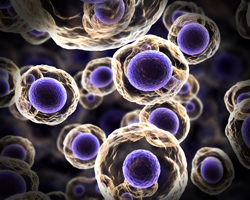Understanding the mechanisms of cell division
Activation of the separase protease, a proteolysis-conducting enzyme, takes place during the mitosis or meiosis stage (anaphase) when chromosomes separate and each chromatid moves to opposite poles of the cell. Alterations in this process may interfere with normal sorting mechanisms offered by cohesin. This is a protein complex that regulates chromosome segregation during cell division. Another function of separase, independent of protease, promotes the cell cycle to complete and exit the mitotic stage. The 'Molecular mechanism of separase dependent PP2ACdc55 downregulation' (Chromosome stability) project set out to address the molecular workings of this non-proteolytic activity and how separase downregulates Cdc55 isoform of protein phosphatase 2A (PP2ACdc55) PP2ACdc55 at the start of anaphase. The EU-funded project's primary objective was to throw light on how separase promotes PP2ACdc55 inactivation in budding yeast. Researchers employed two different approaches. The first approach was to analyse the role of known regulators of PP2A, which is regulated by Ppm1, Ppe1, Rrd1 and Rrd2 coding genes. Experiments aimed to determine the outcomes of deleting these regulators or of making changes to their localisation, abundance and post-translational status in the presence or absence of separase functioning. Results revealed that Rrd2 may play a significant role in regulating PP2A at anaphase onset. The second approach was to examine the role of FEAR components in PP2ACdc55 inactivation. The FEAR regulatory network promotes Cdc14p release from the nucleolus during anaphase. Researchers focused on Slk19, which is a kinetochore-associated protein essential for mitotic checks preventing cells from prematurely exiting mitosis. Slk19 regulates separase localisation. Study results showed that separase and Slk19 interaction is enhanced during anaphase. This suggests that while proteolytic activity on the part of separase is not essential, the C-terminal domain might be important for its mitotic exit function. The C-terminus is the last point along a protein's amino acid chain and can have retention signals for protein sorting. Other project experiments showed that the timely proteolysis of major regulators can be the source of mitotic exit irreversibility.







